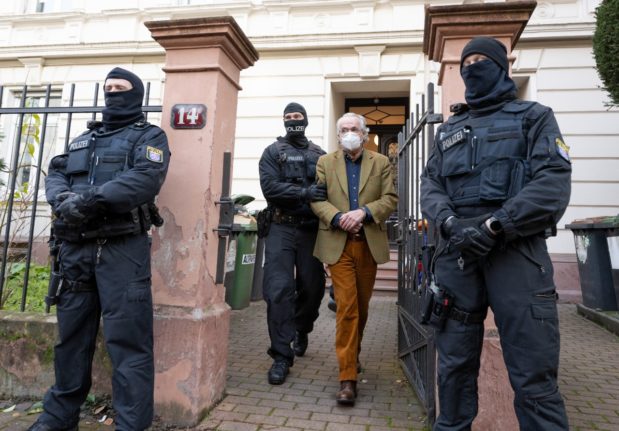Among those charged are 26 people accused of membership in a nationwide extremist network around Frankfurt aristocrat and businessman Prince Heinrich XIII Reuss, and one woman accused of supporting the group.
“The accused are strongly suspected of membership in a terrorist organisation, as well as preparation of a treasonous undertaking,” prosecutors said in a statement on the so-called Reichsbuerger (Citizens of the Reich).
READ ALSO: Who are the Reichsbürger and how big a threat do they pose in Germany?
Given the size of the organisation and the complexity of the alleged plot, three superior regional courts, in Frankfurt, Munich, and Stuttgart, will take charge of putting the suspects on trial.
The accused were captured in raids across Germany last December in a case that made global headlines and prompted a heated domestic debate about how to rein in the country’s growing and increasingly emboldened far-right scene.
The Reichsbuerger had allegedly organised a “council” to take charge after a putsch, as well as a “military arm that would build a new German army”, chief federal prosecutor Peter Frank said at the time. Frank said some members of the “terrorist organisation” intended to use force to enter the German Bundestag (lower house of parliament) and that the group’s preparations were “already at an advanced stage”.
READ ALSO: Germany busts far-right cell planning attack on parliament
Increasingly radicalised
Around 3,000 officers, including elite anti-terror units took part in the early morning raids against the group last year, searching more than 130 properties in what German media described as one of the country’s largest-ever police actions against extremists.
They allegedly planned to appoint Heinrich XIII, who was among those charged, as Germany’s new leader after the coup. He had sought to make contact with Russian officials to discuss Germany’s “new state order” after the coup, prosecutors said, although there is no indication that the Russian contacts were receptive to the request.
Birgit Malsack-Winkemann, a former member of parliament for the far-right AfD party and Berlin judge, was also among those charged on Tuesday. The ex-MP had allegedly been tapped by the group to take over as justice minister after the planned coup. Other suspected members comprise current and a few former members of the German army, including an active soldier in the KSK special forces.
The Reichsbuerger movement includes far-right extremists, conspiracy theorists and gun enthusiasts who reject the legitimacy of the modern German republic. Its followers generally believe in the continued existence of the pre-World
War I German Reich, or empire, under a monarchy and several groups have declared their own states. Long dismissed as malcontents and oddballs, the Reichsbuerger have become increasingly radicalised in recent years and are seen as a growing security threat.
READ ALSO: Who was involved in the alleged plot to ‘overthrow German democracy’?



 Please whitelist us to continue reading.
Please whitelist us to continue reading.
Member comments